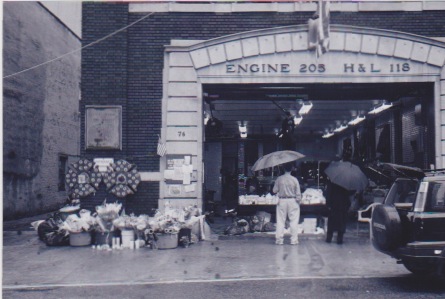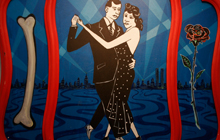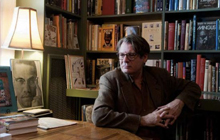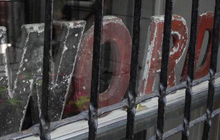Tuesday. September 11th, 2001
09.12.01 A.M.
State of Seige. Brooklyn. Coincidentally the anniversary of my father’s suicide. Yesterday watched the World Trade Center come down from the moment of the second plane. Camilla was at her studio on West 38th, Adam in his first days of 6th grade at Simon Baruch M.S.l on East 21st, and I was writing His Eminence Ernest Emanyanu when I heard the first plane explode and, hearing the collective gasp coming from the direction of P.S. 8 across Hicks St, I spun around off my desk’s chair and around the garden I look out on, wondering, Da fuck was that?
I went down the gardened alley between 38 and 40 Hicks, up the street to Middagh, looked both ways – nothing – came back in the house and freshed up my coffee. Back upstairs and at my desk again I hear my neighbor, Ben, who I can see shaving in his bathroom’s window, yell “Oh, SHIT!”
The fuck? I hollars to Ben.
“I just heard on the radio that a plane’s hit the World Trade Center. Come up to the roof with me!”
Where Jane and their new born, Isabelle, joined us in watching what looked like smoking bullet holes at the tops of the towers. We were mesmerized. It was like nothing so much as being in a Dali painting of matter melting. You’d have thought this was staged for the residents of Brooklyn Heights. Whoever planned this has to have seen the 4th of July fireworks staged off the Promenade or envisioned the setting of our wedding two months earlier in the Brooklyn Bridge’s anchorage.
The panorama of the New York harbor under a crystal meth blue sky: the Statue of Liberty, Ellis Island, the Battery, the Financial District, Wall Street, The Woolworth Building, The World Trade Towers, City Hall, with the Brooklyn Bridge, the symbol of modernity itself, looming. From the first stop here in Brooklyn, Lower Manhattan is the façade of America, which backs it up. Watching the World Trade Center go down in this setting it was impossible to separate the reality from the symbolism and the symbolism from pop product’s expectations. Where were Bruce Willis and Shelly Winters?
On the near deserted Promenade, off Columbia Heights & Middagh, balcony, front row center, I meet an old woman, twice my age and half my height, a holocaust survivor, a Polish Jew with those unfashionable number tattoos on her wrist, who’s a psychoanalyst on her way to work, “Three blocks from there, my office.” I tell her, was on my way to the Borders Book shop on Church and Vesey, that I am a German-Catholic from Stearns County, Minnesota whose book, Life Turns Man Up and Down, is officially published this morning and who is going to sign copies there at 10:30.
Behind us, off Cranberry St (the block Cher’s house in Moonstruck is on) are three utility workers – ConEd, Time-Warner, I couldn’t tell you – who get accusatory and retaliatory. “Fuckin’ towel-heads!” one of them yells. Herself turns around and poses, “Fuckin’ towel-heads? What you mean ‘Fuckin’ towel-heads’? Is this jihad or is it Timothy McVeigh? What is appearance here? What is reality?” Beats me.
Camilla calls, having been caught up in a panic in the streets, all shook up. Bomb scares closed Grand Central, Penn Station and Port Authority, the Garment District and Fashion Avenue during the four hour stretch the subways didn’t run today. You can’t get from Manhattan to Brooklyn except to walk and you couldn’t get from Brooklyn to Manhattan by any means. As I spoke to her by phone, I could barely hear her for the screaming and the sirens. I couldn’t pick Ad up from school and felt it was safer for him to stay at Nevine’s (formerly Camilla’s) on 19th St. I called her around 1 to tell her to go pick him up from school. She’d just woke up and had no idea anything was amiss.
Have we met the enemy and he is us, or is he them, or are we The Other? Some Other is the ubiquitous media popular answer. There’d been a message from my sister Kim, calling during all this, imploring me to call. She’d heard from Kent, who’d heard from Min, who’d got a call through first thing on hearing and knew we were alright. When I spoke with her later, Kim’s first concern was with Clayton having to go to war and her second that New York was “getting far too much attention.” It was her feeling that people should be more concerned for Minnesota.
Minnesotans seem to take a perverse pleasure in taking on other’s problems, making them their own vehicle for self-righteous self-pity, and, in turn, depreciating the initially wronged party. She thinks “the worst isn’t over” and Bloomington, a faceless suburb out by the airport, and it’s Mall of the Americas as the next likely target and as a worthy source of panic. She decreed the trip from Minnetonka to their lakeside trailer up north too fraught with danger to make this weekend. I have to admit, it hadn’t occurred to me to be concerned about a terrorist attack on Minnesota that hadn’t happened. Insensitive of me, I’m certain; just another one of those damn New Yorkers who think-they’re-so-smart.
Armageddon. This was an event of Biblical proportions. Bloomington wouldn’t have done it justice. When the towers collapsed, a storm cloud of debris evoking the rhinoceros of James and the Giant Peach, the wildly surreal circumstances of James’s parents demise relived over the New York harbor, enveloped the island so you couldn’t see Manhattan from Brooklyn.
Throughout the afternoon the refuges from Lower Manhattan crossed the East River by Bridge and ferry. The thousands of evacuees beneath Canal Street were directed over the Brooklyn Bridge, programmed people powdered white, not a few bloodied. At Paula’s Place, our block’s coffee and candy store, Paula, our Shelly Winters, was handling a bunch of stragglers at loose ends. An older, overweight woman was in a diabetic swoon. A younger man in a ash dusted business attire and a Lucifer-esque soul shadow had a narrow escape and needed to tell someone. Half a block up Middagh, I called Fr. George out of his Rectory. He knew a nurse.
Rev. Blackburn of the Plymouth Church came by and we found ourselves enmeshed in a conversation on culpability, responsibility and paradox. I got a kick out of the Rev. but it was a little too soon for a prayer vigil. Instead I went down to Front Street, under the Bridge, and Les Coquins, my local bistro, where more of the stricken congregated. While no regularly scheduled ferry presently connects the Heights to the Financial District, all of a sudden it did.
Philip was running the place by himself and making a pretty girl a big salad and, when two suits from Morgan Stanley came in, I proprietarilly asked if there was anything they needed help with? They wanted to use the phones. The blue-pinstripe, blue shirt, white collar with the wire-rims reached his wife on the Upper East Side and told her he still is, which she had no reason to believe – she told him – from what she was watching on t.v.
As he explained, just after 8 a.m. he was hosting a business breakfast in his office on the 66th floor of the the Trade Center. Soon thereafter, the first plane crashed into the tower opposite. On seeing this, everyone on the 66th floor split, in an orderly fashion. It took however many people that was seventeen minutes to ride the requisite elevators, changing once and again to achieve full dissent, and another minute or so to get out the door, at which point they turned to see the second plane impact their office. From there they took a circuitous route, first downtown, then to the East River, dodging debris and mob scenes.
By the time I got them on their way to the car service on Henry Street, after a series of phone calls, they’d established all but three of those they knew to be working in their offices were accounted for. As of this morning, with the exception of our firehouse on Middagh, Engine 205 – no one I’ve spoken to seems to have lost a family member or a friend. Someone’s left flowers in front of the firehouse. Those guys were the first on the scene. I’m dreading hearing the numbers.
* P.M.
Eight of our firemen died. The two trucks are lost. I’m looking for my neighbor, Paul a graphic designer/fireman who grew up around the corner, on Middagh, where he lives with his wife. All-American homegrown Heights guy, with the lantern jaw, Episcopalian charm, drives a rusty red BMW, landed by penniless. Undaunted, he’s restoring a ’64 Mustang, like my father-in-law’s car. We’re always talking cars. I’m not finding him.
The noise level’s rising. Sirens that really scream, motorcades of who? on the BQE, heavy equipment tripping car alarms and constrained anger at the rising decibel level. Army helicopters and small planes cruising the ruins rise from din to clamor. Television’s streaming grim headlines fray house-bound nerves thin.
Late afternoon a semblance of normality returned to the Promenade. A cloudless day marred by the burning debris. Camilla’s internalized her emotions and spent the day in bed nauseous. Very difficult to come to terms with.
* From the L.A. Times. 09.12.11. Between the Covers: Fall Books Offer Compelling Works of Emotional Depth. By David L. Ulin.
Last paragraph: “Of course, no book this fall is as unexpected, or as unexpectedly delightful, as “Life Turns Man Up and Down” (Pantheon), a sampler of African market literature selected by Kurt Thometz. Market literature, Thometz tells us, was an indigenous phenomenon – pamphlets, popular in Nigeria from the 1940s to the late 1960s, by which a largely oral culture mad the transition to the printed word. Ranging from fiction to advice and inspirational t4racts, and written in an exuberant pidgin English, the material can’t help but recharge our faith in writing, revealing “in demotic, uncooked, Mad English, composited by illiterate printers in broken type, newsprint bound in bush-bruised wraps and distributed from hand to mouth … a potential literature’s growing pains on display.”
* September, 2001. Cornwallville, New York:
Life is a phenomenal thing.
Escaped from New York City in the new Age of Anxiety, back amongst the breeze in the birches. The din of sirens and alarms clashing with the military traffic through the Heights this past week, our downtown dance with death, conflating with the publication of Life Turns Man Up and Down made it an even more surreal scene than our wedding’s setting.
Creativity in the service of resolve, and the grace it requires, is the highest purpose of conflict and the supreme test of style. The City thus far’s met the challenge, showing the requisite poise and reason that’s given it the reputation for squeezing its enemies. New York stays cool when others loose theirs. As in the Klüverism, “In a catastrophe, do the opposite.”
My African Ecclesiastics seem particularly in tune to the tenor of the time. What was up is down and , if I am a measure of anything, what was down is now up. Besides the interuption of what many consider essential services (phone, television, internet), I have been saying that the gravest consequences to us, have been the loss of our firemen and friends of friends. Frank De Martini, the owner of 36 Hicks, next door, is the exception. Frank was the “surveillance engineer” for the WTC and went down with his ship. As he didn’t live next door but in Ft. Greene, we got the news from a Talk of the Town piece in The New Yorker.
Friend Lebowitz remarked on the local news that the degree to which people were affected by the destruction depended a great deal upon proximity. Fran-zinia is quite right in this. To have been a witness has affected us in ways we are only beginning to comprehend. As New Yorkers we’re fairly used to being perceived as affected and now we are. I went to my gym for the first time since the tragedy and I couldn’t remember the combination of the lock I’ve been using three times a week for the past four years and this is, by far, the least of it.
I saw five thousand people died at once. Not virtually. Niot on t.v. I can still taste it. The devastation and state of siege are tangible. I saw the shroud fall on Wall Street. Terror hangs in the air. Dark shadows of what’s not there cast a pall across the East River. The Trade Towers are off the air. We can’t expect others can understand, or care to. We are shocked, just now able to measure some of the effects. Apprehension betters comprehension.
New Yorkers have been remarkably cool throughout. I don’t know any other city in the world has a citizenry better equipped to handle this. There’s been a breakdown of racial and class differences that have always been a given aspect of the urban landscape, the realization of an ideal in the midst of surreal. Ich bien New Yorker. Life turns man up and down, huh?

 Jumel Terrace B&B
Jumel Terrace B&B Life Turns Man Up & Down
Life Turns Man Up & Down The Private Library
The Private Library
Saludos, Caballero!
Love, C.